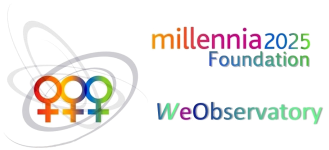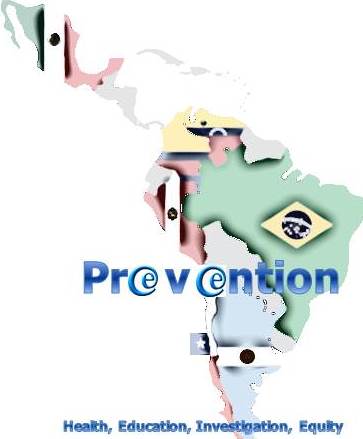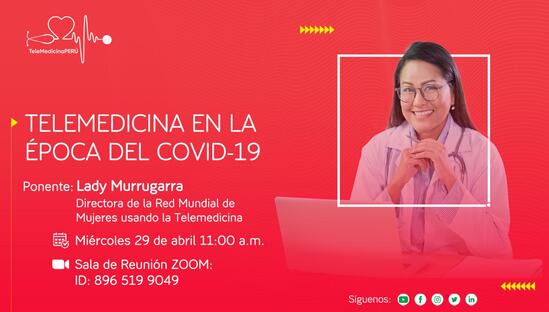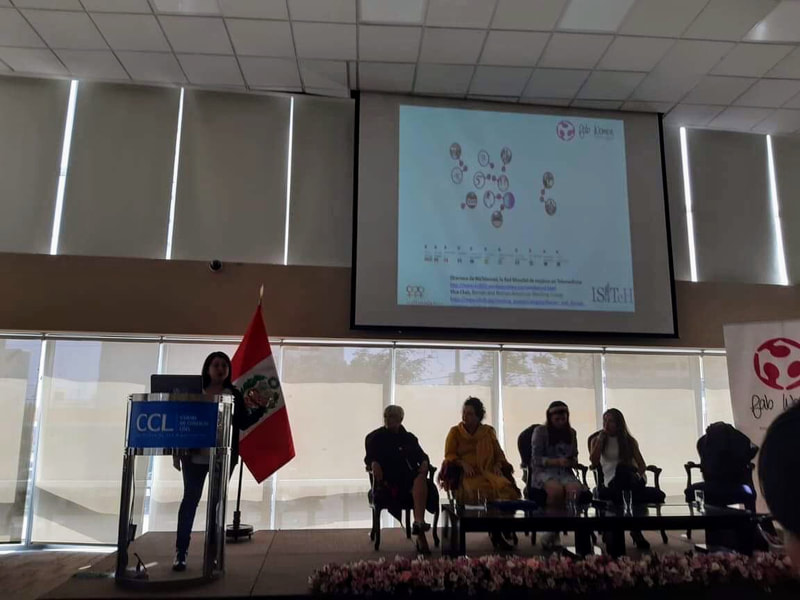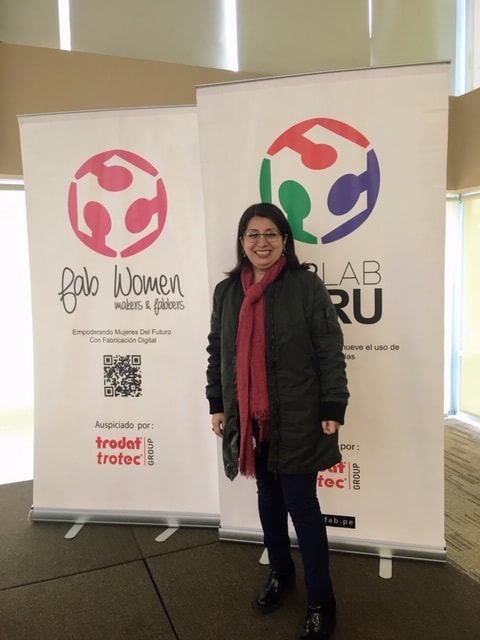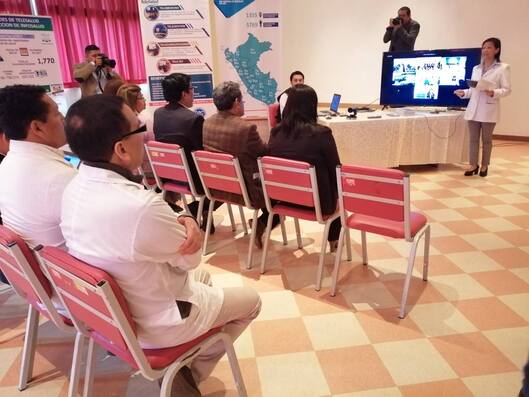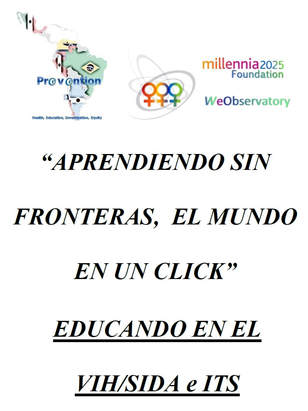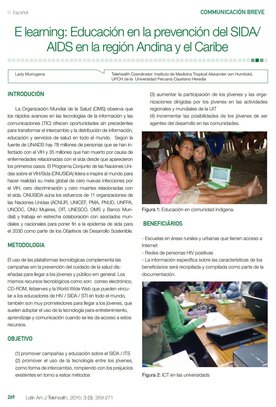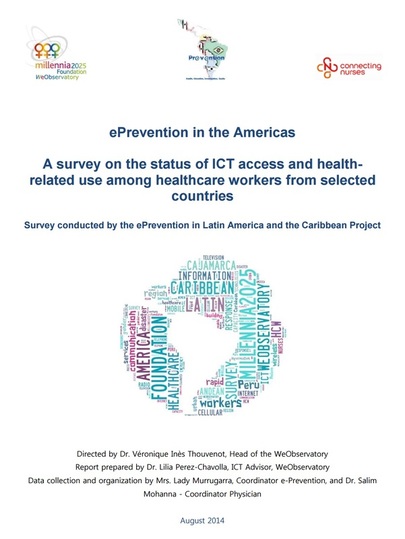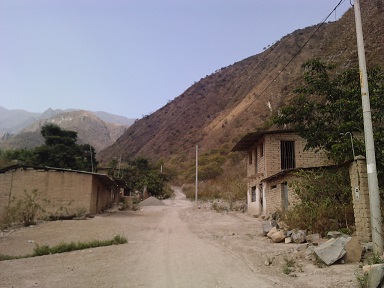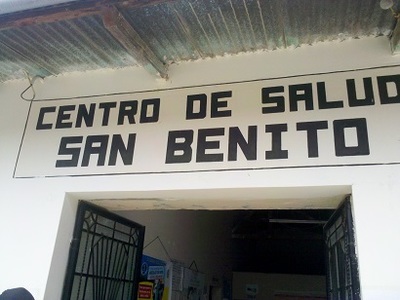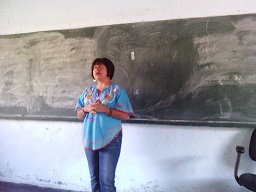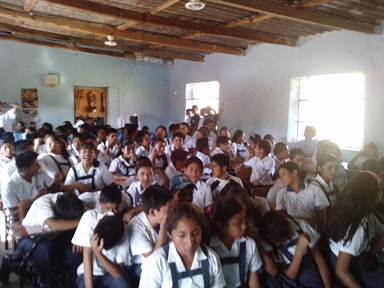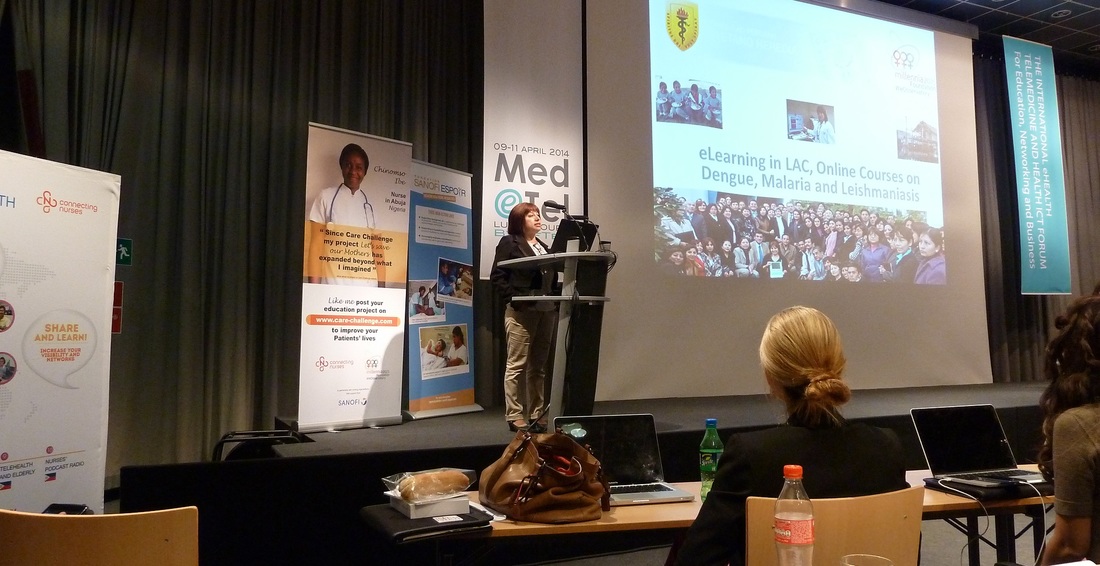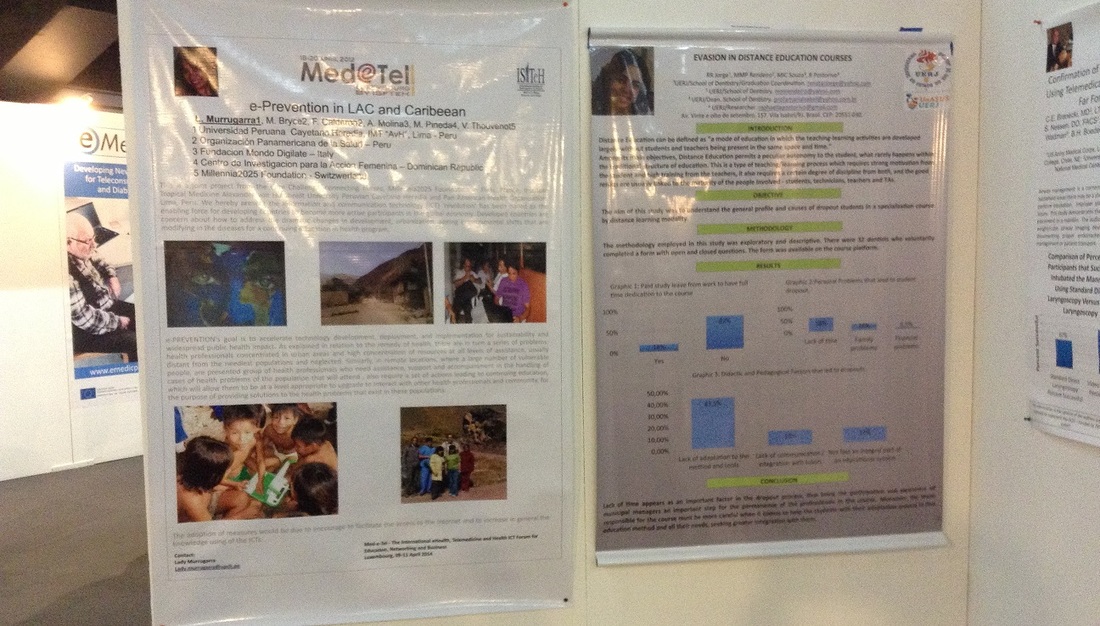Project Name and Responsible
Lady Murrugarra – Coordinator ePrevention in LAC
Instituto de Medicina Tropical, Alexander von Humbold
UPCH Universidad Peruana Cayetano Heredia
Lima 31 Av. Honorio Delgado 430, Peru
ladymurrugarra[at]prevencionlac.org
Director of WeTelemed
Vice Chair of the Iberian and Iberian-American Working Group at ISfTeH
Instituto de Medicina Tropical, Alexander von Humbold
UPCH Universidad Peruana Cayetano Heredia
Lima 31 Av. Honorio Delgado 430, Peru
ladymurrugarra[at]prevencionlac.org
Director of WeTelemed
Vice Chair of the Iberian and Iberian-American Working Group at ISfTeH
News
VideoconferenciaTelemedicinaPerú: Lady Murrugarra - Directora Red Mundial de Mujeres en Telemedicina
Youtube chanel
Youtube chanel
Recent Deliverables
Revista de la AITT, N°3, Feb 2016
ePrevencion is listed in the WHO/PAHO eHealth initiatives
Lady Murrugarra s'engage sur Care Challenge !
⇒ ePrevencion attending UNGA in New York, 20-27 September 2014 [PDF]
ePrevention and WeObservatory Field Trip and Investigation in Cajamarca, January 2014 (11-12.01.2014):
⇒ Programa (Español) [PDF]
⇒ Reporte (Español) [PDF]
ePrevencion is listed in the WHO/PAHO eHealth initiatives
Lady Murrugarra s'engage sur Care Challenge !
⇒ ePrevencion attending UNGA in New York, 20-27 September 2014 [PDF]
ePrevention and WeObservatory Field Trip and Investigation in Cajamarca, January 2014 (11-12.01.2014):
⇒ Programa (Español) [PDF]
⇒ Reporte (Español) [PDF]
ePrevention presented at Medetel:
Project Description
Telemedicine in the developing world mirrors prevention activities to a large extent. The primary benefit of telemedicine lies in facilitating remote access to prevention and care (i.e. by increasing speed of access and/or reducing cost of access). It is thus a technique which can be used to reduce inequity of access to health care. Since the developing world contains many examples of barriers to accessible health care, there are good reasons for supposing, a priori, that telemedicine would be a useful technique in the 21st century.
Although formal health economic studies have not been performed, there is some limited information about costs and benefits. The developing world contains some 5400 million people in 127 countries. Suppose that one in every 10 people sees a health-care professional each year, and that in one in 100 of these interactions, the health-care professional concerned would like to seek a second opinion. Then there would be some 5 million referrals to be dealt with each year.
Since the present telemedicine networks collectively are servicing about 5000 referrals per year, at most, this suggests that only 0.1% of the potential demand is being met. Latin America has a limited number of opportunities for training human resources in global health.
The information and communication technology (ICT) 'revolution' has been hailed as the enabling force for developing countries to become more active participants in the global economy. Developed countries are concerned about how to address the dramatic changes in development, urbanization, ageing environmental shifts that are modifying in the diseases.
Two cultural factors, language and education matter a lot in ICT application by young generation.
The use of education technology to make a difference is not just providing nurses with access to ICT, but also providing integrity properly in the hospital by using the appropriate application at different areas.
Objective: e-PREVENTION's goal is to accelerate technology development, deployment, and implementation for sustainability and widespread public health impact.
Although formal health economic studies have not been performed, there is some limited information about costs and benefits. The developing world contains some 5400 million people in 127 countries. Suppose that one in every 10 people sees a health-care professional each year, and that in one in 100 of these interactions, the health-care professional concerned would like to seek a second opinion. Then there would be some 5 million referrals to be dealt with each year.
Since the present telemedicine networks collectively are servicing about 5000 referrals per year, at most, this suggests that only 0.1% of the potential demand is being met. Latin America has a limited number of opportunities for training human resources in global health.
The information and communication technology (ICT) 'revolution' has been hailed as the enabling force for developing countries to become more active participants in the global economy. Developed countries are concerned about how to address the dramatic changes in development, urbanization, ageing environmental shifts that are modifying in the diseases.
Two cultural factors, language and education matter a lot in ICT application by young generation.
The use of education technology to make a difference is not just providing nurses with access to ICT, but also providing integrity properly in the hospital by using the appropriate application at different areas.
Objective: e-PREVENTION's goal is to accelerate technology development, deployment, and implementation for sustainability and widespread public health impact.
Project Agreement With The WeObservatory
The agreement covers the three following axes:
(a) Telemedicine: support to various forms of investigations on knowledge and skills of participating nurses / personal in the hospital, health center
(b) Library: support to investigations for access to informational resourcesie; public cabins
(c) ePrevention Contents & quality service: Support to generate the bases for the establishment of strategic alliances between the public institutions and participant organizations of the civil society with a view to the implementation of joint initiatives or to the collaboration in concrete actions in strategies for the prevention in the region doing use of the ICT. The adoption of measures would be due to encourage to facilitate the access to the Internet and to increase in general the knowledge of the ICT. Sufficient diversity to serve individuals and communities. The new face in the digital economy is the woman.
(a) Telemedicine: support to various forms of investigations on knowledge and skills of participating nurses / personal in the hospital, health center
(b) Library: support to investigations for access to informational resourcesie; public cabins
(c) ePrevention Contents & quality service: Support to generate the bases for the establishment of strategic alliances between the public institutions and participant organizations of the civil society with a view to the implementation of joint initiatives or to the collaboration in concrete actions in strategies for the prevention in the region doing use of the ICT. The adoption of measures would be due to encourage to facilitate the access to the Internet and to increase in general the knowledge of the ICT. Sufficient diversity to serve individuals and communities. The new face in the digital economy is the woman.
Planned Activities 2013 - 2014
1) Dissemination and increased visibility of selected ePrevention virtual courses and workshops as these activities offer a flexible and interactive learning mode.
2) Support to facilitate availability and access to training opportunities in ePrevention for the nurses in the area rural, indigenous people and communities and online library and multimedia resources
3) Telemedicine : information sharing to promote women's access to science, technology and innovation, encouraging the interest of girls and young women in scientific and technological fields.
4) Increased visibility of the nurses in the Latin America and Caribeean
5) Connect with well-known telemedicine networks, which are currently operating in Latin America and Caribeean.
2) Support to facilitate availability and access to training opportunities in ePrevention for the nurses in the area rural, indigenous people and communities and online library and multimedia resources
3) Telemedicine : information sharing to promote women's access to science, technology and innovation, encouraging the interest of girls and young women in scientific and technological fields.
4) Increased visibility of the nurses in the Latin America and Caribeean
5) Connect with well-known telemedicine networks, which are currently operating in Latin America and Caribeean.
Contacts and Collaborations
LATIN AMERICA AND CARIBEEAN
To promote cooperation between parliaments, international, national organizations, civil society and the private and public sectors at the national and regional level to develop ePrevention.
To promote cooperation between parliaments, international, national organizations, civil society and the private and public sectors at the national and regional level to develop ePrevention.
Results
To support the visibility and dissemination of the development of an ePrevention Platform to guide by bridging the path towards Innovation for Women.
Nurses in the digital economy are supposed to have the greatest priority from the government, investors, thinkers and scientists within the next period as it is the most important parameter that will make a real change in our society.
Nurses in the digital economy are supposed to have the greatest priority from the government, investors, thinkers and scientists within the next period as it is the most important parameter that will make a real change in our society.
Links & Documents
La telemedicina mejora el tratamiento de males infecciosos, 5 de Mayo 2014
Informe de Telemedicina del Perú, OMS, 08 de abril del 2014
Creacion y miembro del grupo hispanico de ISFTEH
GSMA Intelligence: Country overview, Peru, February 2014 [PDF]
The report particularly focuses on operator attitudes to investing in value added services that aim to improve people's lives in verticals such as health, education and finance.
Inteligencia artificial para diagnosticar la tuberculosis
El 90% del dinero para investigación médica se gasta en el 10% de la población
Videos
Detección precoz de la tuberculosi (Spanish)
Peru Medical service team (English, Spanish)
Tecnología en la salud con Maite Vizcarra (Spanish)
Educación en la prevención del VIH - SIDA e ITS Lady Murrugarra, UPCH (Spanish)
Mujeres líderes trabajando con las TICs. Lay Murrugarra (Spanish)
Barra de Mujeres: TICS para lograr la igualdad de género (Spanish)
Peru Medical service team (English, Spanish)
Tecnología en la salud con Maite Vizcarra (Spanish)
Educación en la prevención del VIH - SIDA e ITS Lady Murrugarra, UPCH (Spanish)
Mujeres líderes trabajando con las TICs. Lay Murrugarra (Spanish)
Barra de Mujeres: TICS para lograr la igualdad de género (Spanish)
